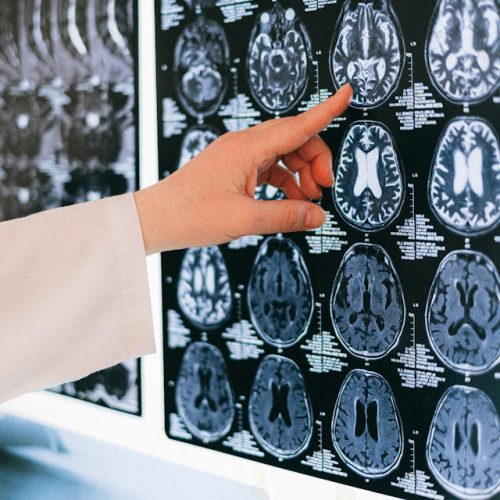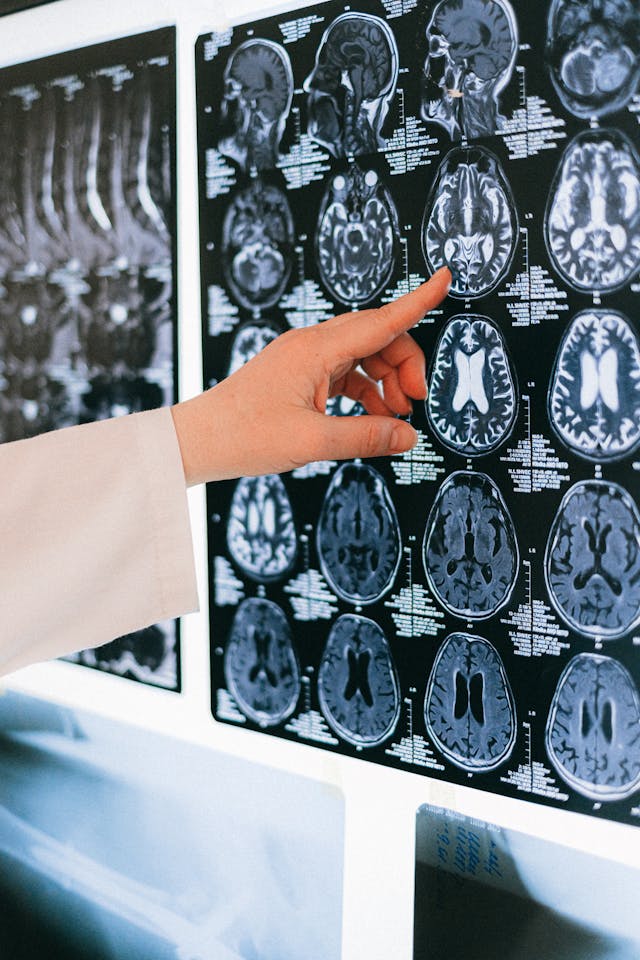Multiple Sclerosis (MS) is a chronic autoimmune disease affecting the central nervous system (CNS). It results from the immune system attacking the myelin sheath, a protective covering around nerve fibers, leading to disruptions in nerve communication.
Alongside physical symptoms, MS is often associated with significant emotional and psychological challenges, including depression.
Symptoms and Signs of Multiple Sclerosis
Symptoms of MS can vary widely and may include:
- Fatigue: Persistent lack of energy that isn’t relieved by rest.
- Numbness or Tingling: Commonly felt in the face, body, or extremities, often described as pins-and-needles sensations.
- Muscle Weakness: Difficulty with coordination and movement, which may lead to difficulty walking or performing daily tasks.
- Vision Problems: Blurred vision, pain in the eyes, or difficulty seeing colors.
- Dizziness and Vertigo: Sensations of spinning or feeling off-balance, often accompanied by nausea.
- Cognitive Changes: Problems with memory (especially short-term memory), concentration, and processing information.
- Emotional Changes: Mood swings, irritability, anxiety, and depression are common. Emotional lability, where emotions change rapidly and unpredictably, can also occur in some individuals.
Causes and Risk Factors
The exact cause of MS remains unknown, but several factors are believed to contribute:
- Autoimmune Response: Immune system attacks myelin.
- Genetic Predisposition: Family history increases risk.
- Environmental Factors: Viral infections, low vitamin D levels, and smoking.
MS most commonly affects individuals aged 20-50 years, with women more frequently diagnosed than men.
Diagnosis of Multiple Sclerosis
Diagnosing Multiple Sclerosis (MS) is a complex process that involves a combination of medical history review, thorough neurological examination, and specific diagnostic tests aimed at confirming the presence of MS lesions in the central nervous system (CNS).
Medical History and Clinical Evaluation
- Medical History: The healthcare provider will take a detailed history, focusing on symptoms suggestive of MS, such as vision problems, numbness or tingling, muscle weakness, coordination difficulties, cognitive changes, and emotional disturbances. They will also inquire about any family history of autoimmune diseases or neurological disorders.
- Neurological Examination: A comprehensive neurological assessment is crucial. This examination evaluates:
- Reflexes: Testing reflex responses, such as knee-jerk reactions, to assess nerve function.
- Coordination: Assessing fine motor skills, balance, and gait to detect any abnormalities that may indicate CNS involvement.
- Sensory Function: Evaluating sensation, including touch, pain, temperature, and vibration sense, to identify areas of sensory deficit.
Diagnostic Tests
- MRI Scan (Magnetic Resonance Imaging)
- Purpose: MRI is the most valuable imaging technique for diagnosing MS. It provides detailed images of the brain and spinal cord, allowing healthcare providers to visualize MS-related lesions or areas of inflammation.
- Technique: During an MRI scan, the patient lies still inside a large, cylindrical machine that uses magnetic fields and radio waves to create detailed cross-sectional images of the brain and spinal cord.
- Types of MRI Sequences: Different MRI sequences, such as T1-weighted, T2-weighted, and gadolinium-enhanced MRI, provide information about the location, size, and activity of MS lesions.
- Lumbar Puncture (Spinal Tap)
- Purpose: A lumbar puncture involves the insertion of a thin needle into the lower back to collect a sample of cerebrospinal fluid (CSF) surrounding the brain and spinal cord. Analysis of the CSF can provide additional evidence of MS.
- CSF Analysis: Laboratory analysis of the CSF includes measuring levels of immune system proteins (e.g., immunoglobulin G) and detecting the presence of oligoclonal bands, which are abnormal proteins associated with inflammation in MS.
- Diagnostic Criteria: The presence of oligoclonal bands in the CSF, in combination with clinical and MRI findings, can support a diagnosis of MS.
Additional Diagnostic Considerations
- Evoked Potential Tests: These tests measure the electrical activity in the brain in response to stimuli (e.g., visual, auditory, or sensory stimuli). Abnormalities in evoked potentials may indicate nerve pathway damage caused by MS.
- Differential Diagnosis: Since MS symptoms can overlap with other neurological conditions, healthcare providers may consider ruling out alternative diagnoses, such as neuromyelitis optica, systemic lupus erythematosus (SLE), or Lyme disease, depending on the clinical presentation.
Treatment Options for MS and Depression
Managing Multiple Sclerosis (MS) and associated depression requires a comprehensive and multidisciplinary approach to address both physical and emotional symptoms effectively.
Medications: Disease-Modifying Therapies (DMTs)
Disease-modifying therapies are the cornerstone of MS treatment, aimed at reducing the frequency of relapses, slowing disease progression, and managing symptoms. These medications work by modifying or suppressing the immune response that attacks the central nervous system. Examples of DMTs include:
- Interferon Beta: Administered via injection, interferon beta helps reduce inflammation and may decrease the frequency and severity of MS relapses.
- Glatiramer Acetate: Also administered via injection, glatiramer acetate modulates the immune response and can reduce relapse rates.
- Fingolimod, Teriflunomide, Dimethyl Fumarate: Oral medications that work to reduce immune system activity and the subsequent damage to nerve fibers.
Each DMT has specific mechanisms of action, benefits, and potential side effects. The choice of therapy depends on factors such as the type and severity of MS, individual health status, and treatment goals.
Symptomatic Treatments
In addition to disease-modifying therapies, symptomatic treatments focus on managing specific MS symptoms that impact daily life:
- Pain Management: Nonsteroidal anti-inflammatory drugs (NSAIDs), muscle relaxants, or anticonvulsants may be prescribed to alleviate MS-related pain.
- Muscle Spasticity: Medications like baclofen or tizanidine can help reduce muscle spasms and stiffness.
- Fatigue Management: Stimulant medications, lifestyle modifications (including regular exercise), and energy conservation techniques are utilized to manage fatigue.
- Bladder and Bowel Dysfunction: Medications, catheterization techniques, and dietary modifications may be recommended to manage bladder and bowel symptoms.
Effective management of these symptoms contributes significantly to improving quality of life for individuals living with MS.
Psychotherapy: Cognitive-Behavioral Therapy (CBT)
Cognitive-behavioral therapy is a form of psychotherapy that has been shown to be effective in managing depression and anxiety associated with MS.
CBT helps individuals identify negative thought patterns and behaviors, develop coping strategies, and modify dysfunctional beliefs. It can also address issues such as adjustment to illness, stress management, and enhancing overall emotional well-being.
Supportive Therapies
Supportive therapies play a crucial role in maintaining functional abilities and improving overall quality of life:
- Physical Therapy: Tailored exercise programs to improve strength, flexibility, balance, and mobility. Physical therapists also educate patients on safe movement techniques and strategies to prevent falls.
- Occupational Therapy: Focuses on enhancing independence in daily activities such as self-care, work, and leisure activities. Occupational therapists may recommend adaptive equipment and modifications to home or work environments.
- Speech Therapy: Addresses speech and swallowing difficulties that can arise from MS-related neurological impairments. Speech therapists provide exercises and techniques to improve communication and swallowing function.
Prevention and Lifestyle Management
Alongside medical and therapeutic interventions, integrating lifestyle modifications can further support overall health and well-being in individuals with MS:
- Nutrition: A balanced diet rich in fruits, vegetables, whole grains, and lean proteins can support immune function and overall health.
- Exercise: Regular physical activity, tailored to individual abilities, can help manage symptoms, improve mood, and maintain physical function.
- Stress Management: Techniques such as mindfulness meditation, relaxation exercises, and support groups can reduce stress and enhance coping skills.
Speaking to Your Doctor
If you experience symptoms of depression or suspect MS, it’s crucial to consult a healthcare professional:
- Seek Medical Evaluation: Discuss symptoms, concerns, and family history.
- Diagnostic Tests: Undergo neurological exams and imaging for accurate diagnosis.
Disclaimer
This article is for educational purposes based on my research. I am not a doctor nor a health advisor. None of the information in this article should be considered without consulting your primary care doctor first.








